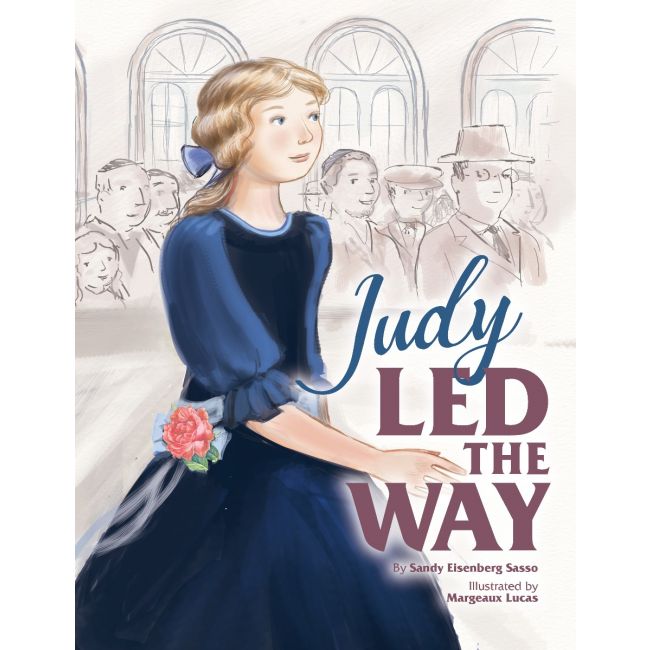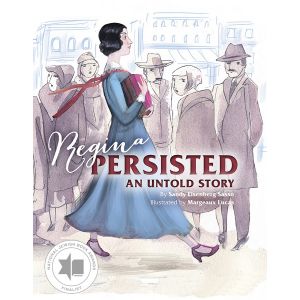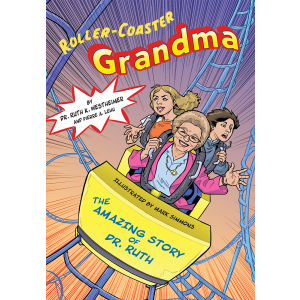Judy Led the Way
Papa, why can't there be music in the synagogue?
Why do men and women sit separately?
Why don't women read the Torah?
Do I have to believe in God?
In the 1920's the world was changing for women. Maybe it was time for things to change in the synagogue as well. But when Judy's father, Rabbi Mordechai Kaplan, said it was time for her to lead services, she nearly dropped the noodle kugel. It was unthinkable--or was it?
The tradition of bat mitzvah in the synagogue had just begun.
EDITORIAL REVIEWS
Judy Kaplan loves to ask all kinds of questions.
Scattered on the pages as if they are written notes, many of her questions are profound and posed to her rabbi father concerning beliefs and traditions of Judaism, even the existence of God. She is particularly disturbed that during services in the synagogue, women sit separately from men, no women read from the Torah, and only boys become bar mitzvah when they turn 13.
It is the 1920s, and women in the United States have both recently won the right to vote and are working at jobs once held only by men. Women are even driving cars. Judy is completely surprised when her father announces that there will be changes in his synagogue. With fears of failure and ridicule, and with only one day to study and practice, 12-year old Judy will become bat mitzvah. She will read a portion of the Torah and sing the blessings at the Saturday morning services. She carries it off beautifully and earns the approval of the whole congregation.
Basing her story on true events and with personal knowledge of the Kaplan family, Sasso tells the tale in straightforward, direct syntax, with a hint of admiration. Lucas strongly hued illustrations enhance the text and provide carefully delineated images of time, place, and Jewish traditions. Readers who are not familiar with these traditions might need some additional explanations. Judy, her family, and the congregation are all depicted with pale skin.
Judy is a force for change. Lovely. (author s note, biographical note) (Picture book/religion. 6-10) --Kirkus Reviews
In this illustrated biography, Rabbi Sandy Eisenberg Sasso tells the story of Judy Kaplan, the first girl to have a bat mitzvah ceremony in the United States in 1922. Judy was the oldest daughter of Rabbi Mordecai Kaplan, the founder of Reconstructionist Judaism. When Judy was twelve years old, Rabbi Kaplan decided it was time for a girl to have a bat mitzvah. Why shouldn’t it be his own daughter? In spite of opposition from her two grandmothers and Judy’s anxiety over something going wrong, Judy stood up on the bimah, recited the blessing, read the Torah portion (in Hebrew and English), and recited the blessing afterwards. This curious and independent-minded girl had done it! One criticism: There is no mention in the text of the year or place where this milestone event occurred.
The endnotes include several intriguing questions for the reader to ponder, such as “Judy played the piano to calm herself when she was worried or anxious. What to you do to help yourself through changes in your life?” The endnotes also provide more details about Judy Kaplan’s successful life as a musician, teacher, composer, and musicologist. Margeaux Lucas created illustrations using a combination of hand painting in gouache and digital art. The clothing, shoes, hairstyles, wallpaper, and furniture of the period are drawn with flair and expression; however, the sash that the suffragettes wore is not depicted accurately. The layout is varied, with Judy’s questions written in freehand script that jump off the page.
This duo also collaborated in Regina Persisted (Apples & Honey Press, 2018) the illustrated biography of Regina Jonas, the first woman rabbi ordained in German in 1935. During this time of pandemic and social unrest when so many people are worried, scared, or angry, this slim biography will inspire girls with the courage to take their rightful place in society. --Anne Dublin for the Association of Jewish Libraries.
ABOUT THE AUTHOR
Sandy Eisenberg Sasso is the author of several nationally acclaimed children's books, including God's Paintbrush, In God's Name and Who is My Neighbor. Publisher's Weekly selected two of her books, But God Remembered and Noah's Wife; The Story of Na'amah as Best Books of the Year. Abuelita's Secret Matzahs is the winner of the 2005 Sugarman Family Children's Book Award and the 2006 Best Books of Indiana Award. A book for adults, Midrash: Reading the Bible with Question Marks, has been issued in paperback in 2013. She is the 2004 recipient of the Helen Keating Ott Award for Outstanding Contribution to Children's Literature. The Shemah in the Mezuzah won the 2012 National Jewish Book Award for Best Illustrated Children's Book. She co-edited the Winter 2014 CCAR Journal entitled, A Symposium on Sacred Teaching and Spiritual Learning and received an Indiana Author's Award in 2019. Sasso has co-authored a series of children's books on New Testament parables with Amy-Jill Levine. She is currently the Director of the Religion, Spirituality and the Arts Initiative, IUPUI Arts and Humanities.
ABOUT THE ILLUSTRATOR
Margeaux Lucas has illustrated many children’s books including Regina Persisted: An Untold Story, and Rachel’s Roses. She lives in New York. Visit her website at www.margeauxlucas.com.





